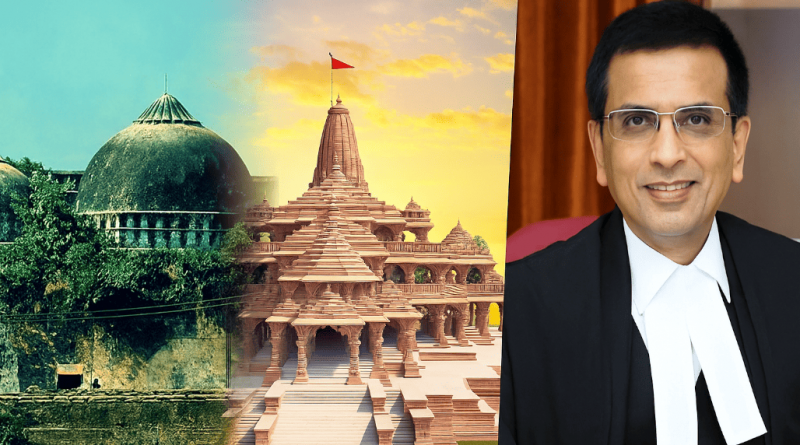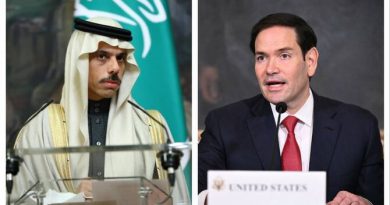OPINION: Former Indian Chief Justice’s Babri Masjid Remark Reopens Old Wounds
Justice Chandrachud’s fresh remark, therefore, risks reigniting controversies which the judgment had carefully attempted to settle.
The Ayodhya dispute has always been one of the most sensitive and divisive issues in independent India. For centuries, the dispute over the Babri Masjid and the claim of it being the birthplace of Lord Ram caused tension, violence, and loss of life. After decades of litigation, the Supreme Court of India delivered its final judgment on 9th November 2019.
As an advocate and as the President of All India Pasmanda Muslim Mahaaz Telangana, my stand at that time was neutral. Not because the judgment was universally fair, but because it was long pending, and because thousands of lives had already been lost to this conflict. Closure was necessary. Endless agitation and litigation would have only deepened divisions and harmed the country further.
When the judgment was delivered, all political parties and communities gave their consent to abide by it. The nation was placed on high alert fearing unrest, but Indian Muslims—despite their disappointment—cooperated peacefully.
Even during the inauguration of the Ram Mandir after prana pratistha (consecration) in January 2024, Muslims once again displayed patience and tolerance. Many even participated in the ceremony as a gesture of goodwill. These actions demonstrated the mature and tolerant character of Indian Muslims.
Yet today, almost six years later, former Chief Justice of India DY Chandrachud has stirred fresh controversy with his remarks.
Chandrachud’s Controversial Statement
In an interview with Srinivasan Jain on Newslaundry, Justice Chandrachud said that the construction of the Babri Masjid itself was an “act of desecration,” meaning it disrespected something sacred that already existed at the site. Coming from a jurist of his stature, this statement naturally carries weight. But it also raises concerns.
The Supreme Court, in its landmark judgment, consciously avoided such language. The Court dealt with evidence, possession, and patterns of worship, without branding the mosque’s very existence as unlawful or sacrilegious. Justice Chandrachud’s fresh remark, therefore, risks reigniting controversies which the judgment had carefully attempted to settle.
Justice Chandrachud’s recent statement is deeply problematic on two fronts.
First, it directly contradicts the Supreme Court’s own findings. The 2019 judgment never established that a temple was demolished to construct the Babri Masjid. The Archaeological Survey of India (ASI) had reported that remains of a 12th-century structure were found beneath the mosque, which itself was built in the 16th century—a gap of nearly four centuries.
Crucially, the ASI admitted it could not prove who destroyed the earlier structure, why it was destroyed, or whether the mosque was deliberately built over it. Recognizing these limitations, the Court made it clear that ownership of the land could not be determined solely on the basis of archaeology.
Despite this, Justice Chandrachud has now described the mosque’s very construction as an “act of desecration,” a remark that goes well beyond the careful balance of the judgment he himself had delivered.
Second, his words risk reigniting tensions that the Court had tried to settle. For Indian Muslims, the statement feels like salt rubbed into an old wound. The community has already borne immense pain and loss over the decades. To now be told that the very act of building their mosque was wrong from the beginning is not only deeply hurtful, but also threatens to undo the fragile peace and understanding that communities had painstakingly built in the aftermath of the judgment.
Justice Muralidhar’s Criticism
It is not just the Muslim community that finds fault with the handling of the Ayodhya case. Former Chief Justice of Odisha High Court, Justice S. Muralidhar, has also been critical of the 2019 verdict.
Justice Muralidhar observed that the judgment was effectively an “authorless judgment”. He also pointed out that sufficient time was not given for mediation. Given the centuries-old nature of the dispute, he argued, the mediation process could have been pursued more seriously to achieve a more consensual outcome.
When asked about this criticism in an interview with journalist Saurabh Trivedi on The Lallantop, Justice Chandrachud responded that the dispute was centuries old, had already claimed many lives, and that closure was necessary for the well-being of society. According to him, the intention of the bench was to end the matter so that the country could move forward.
Ironically, by making his recent statement about “desecration,” Justice Chandrachud has contradicted his own reasoning. Instead of bringing closure, he has reopened wounds and created new controversies.
A Blow to Judicial Credibility
When a retired Chief Justice speaks in ways that contradict a judgment he was part of, it inevitably raises questions about credibility—both of the individual and of the institution he once led.
Justice Chandrachud’s post-retirement interviews, where he repeatedly defends or expands on his judgments, have also come under scrutiny. Instead of clarifying, these interviews are worsening the situation. By taking a polarised stance, he is now being seen by many not as a respectable statesman, but as a controversial figure.
The judiciary is supposed to stand above politics. But such remarks blur the line between law and political narrative.
Illegal Acts Acknowledged, Yet No Accountability
The Ayodhya judgment of 2019 categorically held that both the installation of idols inside the Babri Masjid in December 1949 and the demolition of the mosque in December 1992 were illegal acts. Yet, in the aftermath of the verdict, several individuals—including Members of Parliament at that time—openly boasted on media channels that they were proud to have participated in the demolition.
What is even more shocking is that despite the Supreme Court itself declaring the demolition unlawful, all those accused in the case were later acquitted by a special CBI court, raising serious questions about accountability and the consistency of our justice system.
The Sufferings of Pasmanda Muslims
For Muslims, the Ayodhya judgment was already painful. Thousands of lives—mostly disproportionate Pasmanda Muslims—were lost in the riots and violence that followed the Babri Masjid conflict over the decades. Many Pasmanda Muslims lost their homes, livelihoods, and dignity in the aftermath of this dispute.
To now hear, years later, that the mosque’s construction itself was a “fundamental act of desecration” is not just painful—it is an insult to the memory of those who suffered and a reopening of wounds that had only just begun to heal.
The Absence of Pasmanda Representation in Judiciary
This controversy also forces us to look at a broader problem: the absence of Pasmanda Muslim representation in the higher judiciary.
In 75 years of the Republic, no Pasmanda Muslim has ever risen to the position of Chief Justice of India. In fact, Muslims as a whole are severely underrepresented in the higher judiciary. This absence matters. When decisions and remarks of great consequence are made about our faith, our history, and our future, the lack of Pasmanda voices at the table becomes glaring.
How can justice feel inclusive when entire communities are excluded from positions of power? The judiciary, like the legislature and the executive, must reflect the diversity of India. Otherwise, it remains an elite space dominated by a few privileged groups, leaving Pasmanda Muslims and other marginalized sections unheard.
Justice Chandrachud’s remarks were not just unnecessary—they were damaging. The nation had already moved forward after the 2019 judgment. Muslims, despite their pain, showed maturity, cooperation, and restraint. By reopening this matter, Justice Chandrachud risks disturbing the fragile social fabric once again.
The way forward is not to dwell on divisive statements but to demand greater inclusivity in our institutions. Pasmanda Muslims, who form the overwhelming majority of India’s Muslims, must step forward in education, in the Bar, in the Bench, and in public life. Until our voices are represented in decision-making spaces, justice will always feel incomplete.
India deserves a judiciary that not only delivers justice but also reflects the nation’s true diversity. Only then can peace and harmony be truly secured.
Disclaimer: Views expressed by writers in this section are their own and do not reflect Milli Chronicle’s point-of-view.



